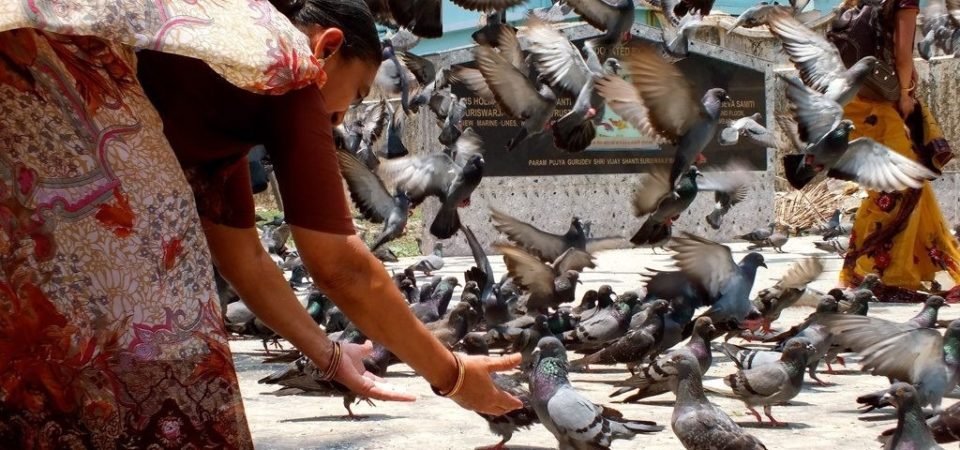Often when struggling with the daunting and discouraging environmental issues confronting humanity, I reflect on the strategy of the Jains and its central teaching of nonviolence. While this religious approach may not suit all, I believe there are some principles which could be shared more broadly to become part of the foundation of a sustainable future built on principles of respect, compassion, and discipline. This week, Maneka Sanjay Gandhi introduces ahimsa –the central, non-violence duty of Jainism.
– Dr. Sulekh C. Jain
I was born a Sikh but have always felt a Jain. More than any other religion, Jainism believes implicitly in the law of karma. As you do, so shall you be done by. The lack of knowledge about one’s actions – a child stomping on an ant, for instance– does not absolve you. Positive, beneficial actions reap their own benefits. Negative, hurtful, and pain causing ones have their own reactions. One does not cancel out the other. Each has an impact on what will happen to you. The worst karmic defilement of the soul takes place when one causes hurt to any other creature.
Mahavir’s words—“you are that which you intend to hit, injure, insult, torment, persecute, torture, enslave or kill.”
Jain Dharma sees the whole universe as a great cosmic mechanism. Humans, as part of that mechanism, must conduct ourselves in harmony and rhythm with it. Anything said or done in this world is echoed back with the same intensity. One could even say that the global ecological crisis that is threatening the entire human race is the consequence of an echoing back of our own negative thoughts, words and actions.
Each being is a vital thread in another’s life tapestry and our lives are woven together for a reason – to survive and be happy. Everything works according to its nature. But humans live out of sync with the mechanism when we go against our qualities of love, kindness and friendship for all living beings. When we forget how so many invisible lives have made our single day liveable and comfortable we imperil our own lives.
The best way to see that negative actions are kept to a minimum is to think through your actions and see if they are necessary to your existence. If you understand that each shoe, wallet, steak or diamond has consequences for yourself and other beings would you do it?
If we make the right choices we will get the right consequences. Lord Mahavir says:
“One who neglects or disregards the existence Of earth, water, fire, air, vegetation and all other lives Disregards his own existence Which is entwined with them.”
Ahimsa means non-injury. Jains consider nonviolence to be the most essential duty for everyone (ahinsā paramo dharmaḥ). It is an indispensable condition for liberation from the cycle of reincarnation, the ultimate goal of Jainism. According to Jainism every act by which a person directly or indirectly supports killing or injury is violence (himsa), which creates harmful karma. The aim of ahimsa is to prevent the accumulation of such karma. Jains share this goal with Hindus and Buddhists, but their approach is particularly comprehensive. Their scrupulous and thorough way of applying nonviolence to everyday activities and food shapes their lives and is the most significant hallmark of Jain identity.
Jain vegetarianism is central to ahimsa. It is not just a matter of not eating meat. It is eating less, eating your last meal before sunset, eating while sharing, eating that which is in season and local. This discipline and thoughtfulness about food should extend to all areas of one’s life. To me it means the training of the body and mind to appreciate everything – want nothing.
Jains believe that all animals, plants, and human beings contain living souls. Each soul is of equal value and should be treated with respect and compassion.
Abstinence from killing other animals must be observed by thought, word and deed – Mana, Vachana and Kaya. The discipline imposed is purity of thought, word and deed. It is not enough if one abstains from inflicting pain on other beings; if you approve of such conduct in others, that approval makes you responsible for the cruelty of killing practiced by others. Do not kill nor kill through an agent nor approve the evil deed. Consider the life you live, and evaluate the suffering it causes. Is it worth the consequences?
Maneka Sanjay Gandhi, The Union Minister for Women and Child Development, Government of India
MAHB-UTS Blogs are a joint venture between the University of Technology Sydney and the Millennium Alliance for Humanity and the Biosphere. Questions should be directed to joan@mahbonline.org.
MAHB Blog: https://mahb.stanford.edu/blog/ahimsa/
You can learn more about Jainism through Michael A. Giannelli, Ph.D.’s article Why I Admire Jains, which appeared in Jain Spirit in 1999.
The views and opinions expressed through the MAHB Website are those of the contributing authors and do not necessarily reflect an official position of the MAHB. The MAHB aims to share a range of perspectives and welcomes the discussions that they prompt.
